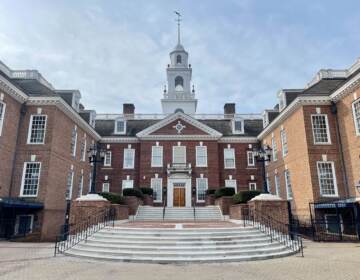The last midterm: Mississippi’s William Faulkner election
William Faulkner, the bard of segregated Mississippi, once wrote: "The past is never dead. It's not even past."

President Donald Trump watches as Sen. Cindy Hyde-Smith, R-Miss., speaks during a campaign rally at the Landers Center Arena, Tuesday, Oct. 2, 2018, in Southaven, Miss. (AP Photo/Evan Vucci)
William Faulkner, the bard of segregated Mississippi, once wrote: “The past is never dead. It’s not even past.” How true that is. Faulkner has been dead for 56 years, but thanks to Senator Cindy Hyde-Smith, Mississippi’s racist past is alive and well.
Hyde-Smith, who’s on the ballot tomorrow in the year’s last Senate election (it’s a runoff under Mississippi rules, because no candidate cleared 50 percent on Nov. 6), is the quintessential Trumpist candidate for a GOP that has forever soiled its heritage as the “party of Lincoln.” She’s favored to keep her seat because she’s totally in sync with the Dixie white mentality that has long prevented the state from joining the 21st century. It would be a minor miracle if she were to lose the election to Democrat Mike Espy, especially given the fact that he’s black and that Mississippi hasn’t been represented in the Senate by a black person since 1870, an appointee during the ill-fated era of Reconstruction.
Most observers outside of Mississippi have been appalled, these last few weeks, by the serial revelations about Hyde-Smith, who was appointed to the Senate this spring when incumbent Thad Cochran quit because of illness. You might be tempted to assume that Hyde-Smith’s candidacy has been doomed by the drumbeat of news:
She was caught on video telling a supporter that if he “invited me to a public hanging,” she would happily sit in “the front row.” (When critics pointed out that Mississippi once led the nation in lynchings, she insisted that her remark was merely “an exaggerated expression of regard.”)
She was caught on another video praising voter suppression. She told an audience that there are “liberal folks…who that maybe we don’t want to vote. Maybe we want to make it just a little more difficult. So I think that’s a great idea.” (Mississippi’s track record of voter suppression helped inspire the Voting Rights Act of 1965.)
She was photographed in 2014 posing with a Confederate hat and rifle at the homestead of Jefferson Davis, the president of the breakaway nation that fought to keep black people in chains. The caption on her Facebook account read, “Mississippi history at its best!” That was consistent with her proposal, as a state senator in 2001, to establish a Jefferson Davis Memorial Highway. (Mississippi had removed Davis’ name from that stretch of road 70 years ago; Hyde-Smith wanted to bring him back.)
She graduated high school from a segregated private academy that had been created by white parents as a response to a U.S. Supreme Court ruling that desegregated the public schools. As a cheerleader, she posed with a mascot who was dressed as a Confederate general waving a Confederate flag. And a generation later, she sent her daughter to another private academy that was created for whites as a response to that same high court ruling.
In the words of Max Boot, an anti-Trump conservative and ex-Mitt Romney adviser, Hyde-Smith is nothing more than “a neo-Confederate troglodyte.”
But you would be wrong to assume that Hyde-Smith’s candidacy is DOA. This is Mississippi, after all. It’s the only state that still flies the Confederate emblem on its flag; the last time that issue was on the ballot, voters approved the emblem by a 2-1 margin. The last time voters sent a Democrat to the Senate was in 1982. And these days, roughly 65 percent of the state’s registered voters are white; most are the descendants of whites who once identified as Democrats, but who fled to the GOP when the blue party embraced civil rights.
Most importantly, Donald Trump in 2016 won Mississippians by 18 percentage points. He’s as comfortable with their white supremacist ethic as they are with his – which helps explain why he’s slated to stump for Hyde-Smith, at two rallies, before the Tuesday balloting. He insisted the other day that her public-hanging and vote-suppression remarks were “sort of said in jest,” and that’s precisely the kind of fiction that Dixie Trump Republicans prefer to tell themselves.
Moreover, Hyde-Smith’s cowardice – she has been dodging the press in order to avoid answering questions about her history of racism – is not likely to hurt her victory prospects, because most white Mississippians hate the press and don’t want to confront or renounce their history of racism either. A Hyde-Smith spokeswoman say “the gotcha liberal media has taken leave of their senses,” and clearly she knows what plays with the electoral majority.
Does Mike Espy, a former congressman and Clinton-era Secretary of Agriculture, have a chance to make history? Could Mississippi actually vote to leave its past behind? It’s theoretically conceivable – but only if a huge outpouring of moderate suburban whites and an historic surge of blacks (35 percent of the state electorate) take a stand for pluralism. As Espy pointed out, during a debate last week, Hyde-Smith’s attitude has “given our state another black eye that we don’t need.”
But since Georgia and Florida have failed to elect black governors, why should we believe that Mississippi, of all places, would elect a black senator? Granted, the vote tally might be closer than one would normally expect in a red southern state; one Mississippi GOPer reportedly said the other day that “the race is definitely tighter than what it should be.” But it would be pleasant shock if Mississippi were to defy William Faulkner’s credo. There’s a reason why Hyde-Smith fits so comfortably within the Trump Republican party, and that’s far less pleasant to contemplate.
WHYY is your source for fact-based, in-depth journalism and information. As a nonprofit organization, we rely on financial support from readers like you. Please give today.




